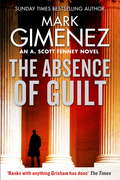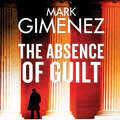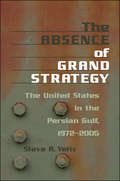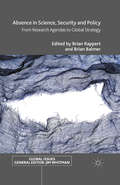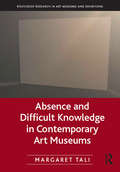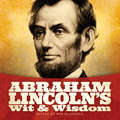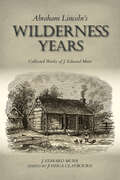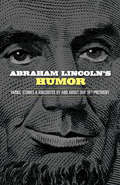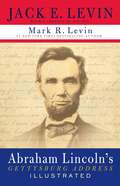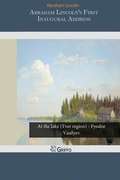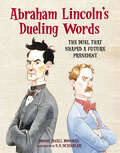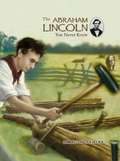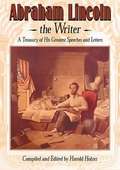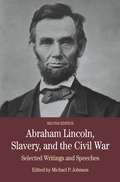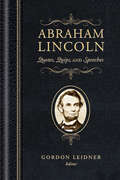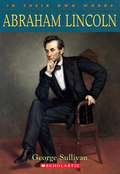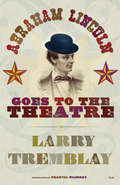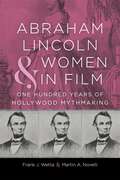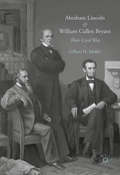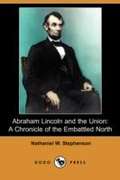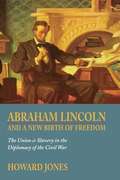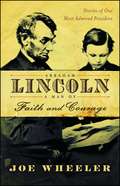- Table View
- List View
The Absence of Guilt (A. Scott Fenney)
by Mark GimenezMark Gimenez, author the massive international bestseller The Colour of Law, is back, as superstar lawyer Scott A. Fenney takes the stand for an impossible case. An ISIS attack on America is narrowly averted when the FBI uncovers a plot to detonate a weapon of mass destruction in Dallas, Texas during the Super Bowl.A federal grand jury indicts twenty-four co-conspirators, including Omar al Mustafa, a notorious and charismatic Muslim cleric known for his incendiary anti-American diatribes on YouTube and Fox News. His arrest is greeted with cheers around the world and relief at home. The President goes on national television and proclaims: 'We won!'There is only one problem: there is no evidence against Mustafa. That problem falls to the presiding judge, newly appointed U.S. District Judge A. Scott Fenney.If Mustafa is innocent, Scott must set the most dangerous man in Dallas free, with no idea who is really guilty.And with just three weeks before the attack is due . . .
The Absence of Guilt (A. Scott Fenney)
by Mark GimenezMark Gimenez, author the massive international bestseller The Colour of Law, is back as superstar lawyer Scott A. Fenney takes the stand for an impossible case.An ISIS attack on America is narrowly averted when the FBI uncovers a plot to detonate a weapon of mass destruction in Dallas, Texas during the Super Bowl.A federal grand jury indicts twenty-four co-conspirators, including Omar al Mustafa, a notorious and charismatic Muslim cleric known for his incendiary anti-American diatribes on YouTube and Fox News. His arrest is greeted with cheers around the world and relief at home. The President goes on national television and proclaims: 'We won!'There is only one problem: there is no evidence against Mustafa. That problem falls to the presiding judge, newly appointed U.S. District Judge A. Scott Fenney.If Mustafa is innocent, Scott must set the most dangerous man in Dallas free, with no idea who is really guilty.And all with just three weeks to go before the attack is due . . .
The Absence Of Grand Strategy: The United States In The Persian Gulf, 1972-2005
by Steve A. YetivGreat powers and grand strategies. It is easy to assume that the most powerful nations pursue and employ consistent, cohesive, and decisive policies in trying to promote their interests in regions of the world. Popular theory emphasizes two such grand strategies that great powers may pursue: balance of power policy or hegemonic domination. But, as Steve A. Yetiv contends, things may not always be that cut and dried. <p><p> Analyzing the evolution of the United States' foreign policy in the Persian Gulf from 1972 to 2005, Yetiv offers a provocative and panoramic view of American strategies in a region critical to the functioning of the entire global economy. Ten cases—from the policies of the Nixon administration to George W. Bush's war in Iraq—reveal shifting, improvised, and reactive policies that were responses to unanticipated and unpredictable events and threats. In fact, the distinguishing feature of the U.S. experience in the Gulf has been the absence of grand strategy. <p> Yetiv introduces the concept of "reactive engagement" as an alternative approach to understanding the behavior of great powers in unstable regions. At a time when the effects of U.S. foreign policy are rippling across the globe, The Absence of Grand Strategy offers key insight into the nature and evolution of American foreign policy in the Gulf.
The Absence of Grand Strategy: The United States in the Persian Gulf, 1972–2005
by Steve A. YetivGreat powers and grand strategies. It is easy to assume that the most powerful nations pursue and employ consistent, cohesive, and decisive policies in trying to promote their interests in regions of the world. Popular theory emphasizes two such grand strategies that great powers may pursue: balance of power policy or hegemonic domination. But, as Steve A. Yetiv contends, things may not always be that cut and dried. Analyzing the evolution of the United States' foreign policy in the Persian Gulf from 1972 to 2005, Yetiv offers a provocative and panoramic view of American strategies in a region critical to the functioning of the entire global economy. Ten cases—from the policies of the Nixon administration to George W. Bush's war in Iraq—reveal shifting, improvised, and reactive policies that were responses to unanticipated and unpredictable events and threats. In fact, the distinguishing feature of the U.S. experience in the Gulf has been the absence of grand strategy.Yetiv introduces the concept of "reactive engagement" as an alternative approach to understanding the behavior of great powers in unstable regions. At a time when the effects of U.S. foreign policy are rippling across the globe, The Absence of Grand Strategy offers key insight into the nature and evolution of American foreign policy in the Gulf.
Absence in Science, Security and Policy: From Research Agendas to Global Strategy (Global Issues)
by Brian Balmer Brian RappertThis book explores the absent and missing in debates about science and security. Through varied case studies, including biological and chemical weapons control, science journalism, nanotechnology research and neuroethics, the contributors explore how matters become absent, ignored or forgotten and the implications for ethics, policy and society.The chapter 'Sensing Absence: How to See What Isn't There in the Study of Science and Security' is open access under a CC BY 4.0 license via link.springer.com.
Absence and Difficult Knowledge in Contemporary Art Museums (Routledge Research in Art Museums and Exhibitions)
by Margaret TaliThis book analyzes practices of collecting in European art museums from 1989 to the present, arguing that museums actualize absence both consciously and unconsciously, while misrepresentation is an outcome of the absent perspectives and voices of minority community members which are rarely considered in relation to contemporary art. Difficult knowledge is proposed as a way of dealing with absence productively. Drawing on social art history, museology, postcolonial theory, and memory studies, Margaret Tali analyzes the collections of four modern and contemporary art museums across Europe: the Hamburger Bahnhof in Berlin, the Ludwig Museum of Contemporary Art in Budapest, the Kiasma Museum in Helsinki, and the Kumu Museum in Tallinn.
Abraham Lincoln's Wit and Wisdom
by Bob Blaisdell"My politics are short and sweet, like the old woman's dance." The most eloquent of American presidents, Lincoln had a sagacious or humorous comment on everything that mattered. This attractively designed and illustrated gift book features the Great Emancipator's thoughts and opinions on subjects from politics to human nature to the burdens and privileges of the presidency.
Abraham Lincoln's Wilderness Years: Collected Works of J. Edward Murr
by J. Edward MurrAbraham Lincoln spent a quarter of his life—from 1816 to 1830, ages 7 to 21—learning and growing in southwestern Indiana. Despite the importance of these formative years, Lincoln rarely discussed this period, and with his sudden, untimely death in 1865, mysterious gaps appear in recorded history. In Abraham Lincoln's Wilderness Years, Joshua Claybourn collects and annotates the most significant scholarship from J. Edward Murr, one of the only writers to cover this lost period of Lincoln's life. A Hoosier minister who grew up with the 16th president's cousins, Murr interviewed locals who knew Lincoln. Part I features selected portions of Murr's book-length manuscript on Lincoln's youth, published here for the first time. Part II offers a series by Murr on Lincoln's life in Indiana, originally printed in the Indiana Magazine of History. Part III reveals letters between Murr and US Senator Albert J. Beveridge, a prominent historian, about Beveridge's early manuscript of the biography Abraham Lincoln, 1809–1858. Of all Lincoln's biographers, none knew his boyhood associates and Indiana environment as well as Murr, whose complete Lincoln research and scholarship have never been published—until now. Abraham Lincoln's Wilderness Years preserves and celebrates this important source material, unique for studying Lincoln's boyhood years in Indiana.
Abraham Lincoln's Humor: Yarns, Stories, and Anecdotes by and about Our 16th President
by John GraftonToday we think of Abraham Lincoln as America's greatest President. He's celebrated for his leadership and his numerous moving speeches, and for helping the nation through the dark time of the Civil War and out of slavery. Not as widely known was Lincoln's talent for humor and storytelling, and this collection shares many of his jokes and parables. Lincoln used homespun whimsy effectively as a traveling lawyer and later as a tool that helped him negotiate policy, gain influence, and teach subtle moral lessons. The joke was often on him: once when being accused of being two-faced, he responded: "If I had two faces, why would I be wearing this one?" Even longtime rival Stephen Douglas recognized the power of Lincoln's message and presentation, conceding that "When he begins to tell a story, I'm overmatched." To truly understand Lincoln, we must appreciate his witty style of communicating.
Abraham Lincoln's Gettysburg Address Illustrated
by Jack E. Levin Mark R. Levin"Fourscore and seven years ago our fathers brought forth on this continent a new nation, conceived in liberty and dedicated to the proposition that all men are created equal." Long before his conservative manifesto Liberty and Tyranny became a #1 New York Times bestseller, Mark R. Levin's love for his country was instilled in him by his father, Jack E. Levin. At family dinners, Jack would share his bountiful knowledge of American history and, especially, the inspiration of Abraham Lincoln. The son of immigrants, Jack Levin is an American patriot who responded with deep personal emotion to Lincoln's call for liberty and equality. His admiration for the great Civil War president inspired him to personally design and produce a beautiful volume, enhanced with period illustrations and striking battlefield images by Matthew Brady and other renowned photographers of the era, that brings to life the words of Lincoln's awe-inspiring response to one of the Civil War's costliest conflicts. Now Jack Levin's loving homage to the spirit of American freedom is available in an essential edition that features his original foreword as well as a touching new preface by his son, Mark Levin. In this way, Abraham Lincoln's Gettysburg Address Illustrated celebrates the passing of patriotic pride and historical insight from generation to generation, from father to son. *** The day following the dedication of the National Soldier's Cemetery at Gettysburg, Edward Everett, who spoke before Lincoln, sent him a note saying: "Permit me to express my great admiration for the thoughts expressed by you, with such eloquent simplicity and appropriateness, at the consecration of the cemetery. I should be glad, if I could flatter myself that I came as near to the central idea of the occasion, in two hours, as you did in two minutes." Lincoln wrote back to Everett: "In our respective parts yesterday, you could not have been excused to make a short address, nor I a long one. I am pleased to know that in your judgement the little I did say was not entirely a failure."
Abraham Lincoln's Gettysburg Address Illustrated
by Mark R. Levin Jack E Levin"Fourscore and seven years ago our fathers brought forth on this continent a new nation, conceived in liberty and dedicated to the proposition that all men are created equal." Long before his conservative manifesto Liberty and Tyranny became a #1 New York Times bestseller, Mark R. Levin's love for his country was instilled in him by his father, Jack E. Levin. At family dinners, Jack would share his bountiful knowledge of American history and, especially, the inspiration of Abraham Lincoln. The son of immigrants, Jack Levin is an American patriot who responded with deep personal emotion to Lincoln's call for liberty and equality. His admiration for the great Civil War president inspired him to personally design and produce a beautiful volume, enhanced with period illustrations and striking battlefield images by Matthew Brady and other renowned photographers of the era, that brings to life the words of Lincoln's awe-inspiring response to one of the Civil War's costliest conflicts. Now Jack Levin's loving homage to the spirit of American freedom is available in an essential edition that features his original foreword as well as a touching new preface by his son, Mark Levin. In this way, Abraham Lincoln's Gettysburg Address Illustrated celebrates the passing of patriotic pride and historical insight from generation to generation, from father to son. *** The day following the dedication of the National Soldier's Cemetery at Gettysburg, Edward Everett, who spoke before Lincoln, sent him a note saying: "Permit me to express my great admiration for the thoughts expressed by you, with such eloquent simplicity and appropriateness, at the consecration of the cemetery. I should be glad, if I could flatter myself that I came as near to the central idea of the occasion, in two hours, as you did in two minutes." Lincoln wrote back to Everett: "In our respective parts yesterday, you could not have been excused to make a short address, nor I a long one. I am pleased to know that in your judgement the little I did say was not entirely a failure."
Abraham Lincoln's First Inaugural Address
by Abraham LincolnIt must have been a tense day as the newly elected President Lincoln stood to declare his first inaugural address. As Lincoln looked over the crowed in what was southern Washington D.C. he must have seen the tension, palpable and thick in the air. The controversy over this Northern elected president sparked the civil war, the very thing he tried to prevent in his address. "[. . . ] That there are persons in one section or another who seek to destroy the Union at all events, and are glad of any pretext to do it, I will neither affirm nor deny; but if there be such, I need address no word to them. To those, however, who really love the Union may I not speak? Before entering upon so grave a matter as the destruction of our national fabric, with all its benefits, its memories, and its hopes, would it not be wise to ascertain precisely why we do it? Will you hazard so desperate a step while there is any possibility that any portion of the ills you fly from have no real existence? Will you, while the certain ills you fly to are greater than all the real ones you fly from-will you risk the commission of so fearful a mistake? All profess to be content in the Union if all Constitutional rights can be maintained. Is it true, then, that any right, plainly written in the Constitution, has been denied? I think not. Happily the human mind is so constituted that no party can reach to the audacity of doing this. Think, if you can, of a single instance in which a plainly written provision of the Constitution has ever been denied. If by the mere force of numbers a majority should deprive a minority of any clearly written Constitutional right, it might, in a moral point of view, justify revolution-certainly would if such a right were a vital one. But such is not our[. . . ]".
Abraham Lincoln's Dueling Words: The Duel that Shaped a Future President
by Donna Janell BowmanAbraham Lincoln was known for his sense of humor. But early in his adult life, it got him into trouble. He had to use his imagination to save his career—and maybe even his life. When Abraham Lincoln became frustrated with the actions of James Shield, a political rival, he came up with a plan. It was silly. It was clever. And it was a great big mistake! Lincoln wrote a series of fictional letters to the editor, complaining about Shields. But when Shields took offense, he challenged Lincoln to a duel. How did our future president straighten things out and save the lives and careers of both himself and his rival?Donna Bowman's humorous voice and S. D. Schindler's expressive illustrations are the perfect match for this story of Abraham Lincoln's humor and wit. Back matter includes an author's note and bibliography.
The Abraham Lincoln You Never Knew
by James Lincoln CollierA biography of Abraham Lincoln that focuses on dispelling common misconceptions and emphasizes how he lived his life with wisdom and compassion.
Abraham Lincoln, the Writer: A Treasury of His Greatest Speeches and Letters
by Harold Holzer Abraham LincolnA collection of speeches and letters of Abraham Lincoln, with brief introductions that provide historical background.
Abraham Lincoln, Slavery, and the Civil War: Selected Writing And Speeches (Bedford Cultural Editions Series)
by Michael P. JohnsonThis collection, skillfully edited by Michael P. Johnson, offers students the essential Lincoln in a brief and accessible format that makes this a must-assign edition for courses covering the antebellum period, slavery, and the Civil War. <P><P>From famous documents like the Lincoln-Douglas debates and the second inaugural address to crucial memoranda and letters, it reveals the development of Lincoln's views on all the critical issues of the day, including free labor, antebellum politics and the Republican party, slavery, secession, the Civil War, and emancipation. <P><P>Significantly streamlined for the second edition to a more student-friendly length, the volume retains its successful format: documents are organized thematically and chronologically, with editorial headnotes that provide just enough context for students to understand the significance of each selection. <P><P>In addition to Johnson's widely praised biographical introduction, a chronology, maps and pictures, questions for consideration, selected bibliography, and a comprehensive index all enhance students' understanding of this crucial period -- and this crucial figure -- in U.S. history.
Abraham Lincoln Quotes, Quips, and Speeches
by Abraham Lincoln Gordon LeidnerMore than 140 years since his death, the enduring legacy of a great president, an American success story, and the celebrated leader of the Civil War continues. Abraham Lincoln: Quotes, Quips, and Speechescaptures the essence of the sixteenth president. In addition to Lincoln's own words, Gordon Leidner includes insights into the man by those who knew him best, from his wife, Mary Todd Lincoln, to his greatest political opponent, Stephen A. Douglas. Numerous photographs add to the charm and usefulness of the book.
Abraham Lincoln (In Their Own Words)
by George SullivanPresents a biography, including excerpts from his speeches, letters, and other writings, of the man who was president during the Civil War.
Abraham Lincoln Goes to the Theatre
by Chantal Bilodeau Larry TremblayAbsurd, hilarious and haunting, Abraham Lincoln Goes to the Theatre is an unforgettable mystery that asks the question: How can we ever know who we are and what is true when the world we know is shifting beneath us? Its answer is simple: John Wilkes Booth was the ?rst American star-the actor who kidnapped reality to transform it into theatre.
Abraham Lincoln for Kids: His Life and Times with 21 Activities
by Janis HerbertProviding a fresh perspective on one of the most beloved presidents of all time, this illuminating activity book tells the rich story of Abraham Lincoln's life and details the events of his era. Highlighting Lincoln's warm, generous spirit and impressive intellect, the guide teaches children about his fascinating life story, his struggles at the onset of the Civil War, and his relevance in today's world. Activities include delivering a speech, holding a debate, drawing political cartoons, and making a stovepipe hat or miniature Mississippi River flatboat. Lively sidebars, abundant photographs and illustrations, and fun projects help to kick the dust off old Honest Abe. Also included are selections from some of Lincoln's most famous speeches and documents, as well as a resource section of Web sites to explore and sites to visit, making this a comprehensive Lincoln biography for young readers.
Abraham Lincoln and Women in Film: One Hundred Years of Hollywood Mythmaking (Conflicting Worlds: New Dimensions of the American Civil War)
by Frank J. Wetta Martin A. NovelliFrank J. Wetta and Martin A. Novelli’s Abraham Lincoln and Women in Film investigates how depictions of women in Hollywood motion pictures helped forge the myth of Lincoln. Exploring female characters’ backstories, the political and cultural climate in which the films appeared, and the contest between the moviemakers’ imaginations and the varieties of historical truth, Wetta and Novelli place the women in Lincoln’s life at the center of the study, including his mother, Nancy Hanks Lincoln; his stepmother, Sarah Bush Lincoln; his lost loves, Ann Rutledge and Mary Owens; and his wife and widow, Mary Todd Lincoln. Later, while inspecting Lincoln’s legacy, they focus on the 1930s child actor Shirley Temple and the 1950s movie star Marilyn Monroe, who had a well-publicized fascination with the sixteenth president. Wetta and Novelli’s work is the first to deal extensively with the women in Lincoln’s life, both those who interacted with him personally and those appearing on screen. It is also among the first works to examine how scholarly and popular biography influenced depictions of Lincoln, especially in film.
Abraham Lincoln and William Cullen Bryant: Their Civil War
by Gilbert H. MullerThis definitive dual portrait offers a fresh perspective on Abraham Lincoln and William Cullen Bryant's crucial role in elevating him to the presidency. The book also sheds new light on the influence that "Bryant and his class" (as Lincoln called the Radical Republican faction whose views Bryant articulated) wielded on the chief executive. How the cautious president and the preeminent editor of the Fourth Estate interacted--and how their ideological battle tilted gradually in Bryant's favor--is the centerpiece of this study. A work of meticulous scholarship and a model of compression, Lincoln and Bryant is a watershed account of two Republicans fighting common enemies (and each other) during the Civil War era.
Abraham Lincoln and a New Birth of Freedom
by Howard JonesIn Abraham Lincoln and a New Birth of Freedom, Howard Jones explores the relationship between President Lincoln's wartime diplomacy and his interrelated goals of forming a more perfect Union and abolishing slavery. From the outset of the Civil War, Lincoln's central purpose was to save the Union by defeating the South on the battlefield. No less important was his need to prevent a European intervention that would have facilitated the South's move for independence. Lincoln's goal of preserving the Union, however, soon evolved into an effort to form a more perfect Union, one that rested on the natural rights principles of the Declaration of Independence and thus necessitated emancipation.Howard Jones is University Research Professor in the Department of History at the University of Alabama. He is the author of numerous books, including Mutiny on the Amistad: The Saga of a Slave Revolt and Its Impact on American Abolition, Law, and Diplomacy which provided the historical basis for the movie Amistad.
Abraham Lincoln, a Man of Faith and Courage
by Joe WheelerHow Lincoln's Faith Shaped His Leadership Undoubtedly the most revered leader in American history, Abraham Lincoln has had more books written about him than all our nation's presidents put together. But for all that's been written, little has focused on his faith and how this quality shaped the man who led our country during its most tumultuous years. Author Joe Wheeler, historian and scholar, brings to the pages of this insightful book the knowledge gleaned from over ten years of study and more than sixty books on the life and times of Abraham Lincoln. Skillfully weaving his own narrative with direct quotes from Lincoln and poignant excerpts from other Lincoln biographers, Wheeler brings a refreshingly friendly rendition of Lincoln's life, faith, and courage. The stories, historical details, and powerful quotes on the pages of this book will leave a lasting impression on your heart, your mind, and your life.
